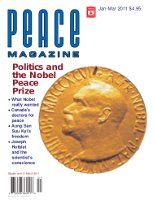
Peace Magazine Jan-Mar 2011, page 27. Some rights reserved.
Search for other articles by Ron Shirtliff here
by Commander Robert Green. Christchurch, NZ: Astron Media, 2010.
Nuclear terrorism has been the unspoken reality behind all the nuclear deterrence strategies of the past 65 years of the atomic era. The great powers have held us citizens as hostages as they maneuvered for their own political ends, playing the MAD game. Even 20 years after the end of the Cold War, two thousand missiles are ready to be launched within minutes, waiting for an attack, or more likely, a misunderstood accident.
Today we are still held hostage by the nuclear powers. And a new threat has emerged. Now we are also potentially threatened by a new breed of mad men, stateless terrorists, who have no innocent civilians behind them who can be held hostage to control their actions. Today nuclear deterrence does not work.
Green argues that it cannot be proven that nuclear deterrence ever did work. It is true that the great powers never fought each other directly during the Cold War, but there were many good reasons other than nuclear deterrence for both sides to avoid a major engagement. Nor was the “ultimate threat” of massive nuclear retaliation ever all-powerful. In 1950 China came to the aid of North Korea regardless of the American monopoly on the bomb; Argentina challenged the UK in the Falklands war despite British nuclear weapons; the mutual possession of nuclear weapons did not deter India and Pakistan from mobilizing for war in 1999 and 2002.
But the mythology of the deterrent power of nuclear strength is alive and well, especially among those who felt that they would be more secure if only they had the bomb. Israel, India, North Korea, Pakistan, and Iran come to mind; certainly there will be others.
However, among the five long-established nuclear nations, faith in the deterrent power of the nuclear arsenal has been weakening. When it is no longer possible to dominate by using nuclear weapons as the final threat, or last resort, then a state may opt to use them up front, thus breaking the longstanding nuclear-use taboo, and leaving open the potential for unrestrained escalation to the ultimate disaster.
In 2002, US president George W. Bush broke the new ground by threatening that the US might use nuclear weapons first against non-nuclear “rogue” (you define the term!) states if they possessed—or were believed to possess—weapons of mass destruction. No policy could express more clearly that the possession of nuclear weapons does not deter war. After a 64-year hiatus, they could be used by the US in “anticipatory self-defence” as just another aggressive weapon, one with frightening consequences.
Unfortunately, the UK, France, and NATO followed suit. Sixty-five years after Hiroshima, the nuclear genie could be let out of the bottle again—this time, perhaps, in a conflict as minor as the Gulf War, breaking the taboo that has reigned so long. Of the nuclear powers only China pledges “no first use of nuclear weapons.”
The author—retired Commander Robert Green, who served in the Royal Navy—argues that this is a critical time to turn back the doomsday clock. He reviews in detail the web of crypto-logic that the nuclear powers have used to justify their immoral targeting of millions of civilians, “to deter war.” He explains how Britain and France got into the nuclear club. He demonstrates that the world is less secure because of the presence of nuclear weapons. He provides a chapter on safer security strategies that exclude nuclear deterrence.
From the point of view of the responsible professional soldier, he looks at the legal and moral implications of the use of nuclear weapons in the light of the laws of war as set out in the Geneva Conventions. He pays special attention to the 1996 World Court advisory decision against the use of nuclear weapons. He also reviews the ridiculous, self-justifying responses to that judgment by the US and the UK. He outlines an architecture for security without the bomb, with special emphasis on the former protagonists of the Cold War.
Tragically, all these years later, the nuclear/military/industrial coalition continues to dominate much thinking about security, thinking that is anachronistic and, as ever, extremely expensive, draining resources from worthy causes like education and development.
The Non-Proliferation Treaty has not worked because of its inherent dishonesty. Those without nuclear weapons were to commit to not acquiring them, and nuclear states were committed to getting rid of theirs. But those with weapons sat on their hands until others pried open the Pandora’s box to get their own weapons for defence against the nuclear states, or to target civilians of an enemy state. Despite its rhetoric, the treaty has been a tool of the old boys’ club and its failure to control the spread of nuclear weapons is now painfully evident.
Green argues convincingly that only an agreement to eliminate all nuclear weapons will control nuclear proliferation. It is time to forge the institutions that can ensure security without holding billions of civilians, and possibly the ecosystem, hostage to the whims of nations with nuclear weapons.
Many readers of Peace Magazine will not need convincing of the immorality and illegality of nuclear terrorism, or the obscenity of targeting civilian populations to secure military ends. In this book we are given the insights of Robert Green, a modern military man. When faced with the possibility of being ordered to commit a war crime against humanity, Green had the courage to opt to change his career, leave the military, and use his analytical and scholarly skills to challenge the shaky logic that is the mainstay of the costly nuclear club.
Reviewed by Ron Shirtliff

Peace Magazine Jan-Mar 2011, page 27. Some rights reserved.
Search for other articles by Ron Shirtliff here